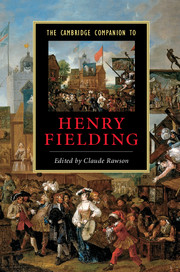Book contents
- Frontmatter
- Introduction
- 1 Henry Fielding’s life
- 2 Fielding’s theatrical career
- 3 Shamela
- 4 Joseph Andrews
- 5 Jonathan Wild
- 6 Tom Jones
- 7 Amelia
- 8 Fielding’s periodical journalism
- 9 Fielding and female authority
- 10 Fielding on society, crime, and the law
- 11 Fielding’s style
- 12 Fielding’s afterlife
- Guide to further reading
- Index
- Series List
11 - Fielding’s style
Published online by Cambridge University Press: 28 July 2007
- Frontmatter
- Introduction
- 1 Henry Fielding’s life
- 2 Fielding’s theatrical career
- 3 Shamela
- 4 Joseph Andrews
- 5 Jonathan Wild
- 6 Tom Jones
- 7 Amelia
- 8 Fielding’s periodical journalism
- 9 Fielding and female authority
- 10 Fielding on society, crime, and the law
- 11 Fielding’s style
- 12 Fielding’s afterlife
- Guide to further reading
- Index
- Series List
Summary
At the beginning of Fielding’s last novel, Amelia (1751), there is an extended account of life in Newgate Prison. It is one of his most unusual and powerful writings, creating a new voice, which, had he lived to write novels again, might have given an additional dimension to Fielding’s already considerable influence on the future of the English novel. This early part portrays a scabrous sub-world of prison inmates and guardians, including not only criminals, but criminalized unfortunates, either guilty of petty offences or more or less innocent. Fielding had dealt with such material before, notably in Jonathan Wild (1743), but without the vivid engagement or the pained intensity of bafflement which mark the opening of this late novel.
The narrative exposes, among other things, the injustices of a legal system personified by the vicious and corrupt magistrate Mr Thrasher, 'who was never indifferent in a Cause, but when he could get nothing on either Side' (A I.ii; W 21). This stingingly conclusive summation belongs to a type not uncommon in Fielding’s prose or that of his contemporaries. It shares features with, or perhaps emulates, the satirical portraiture of the great verse satirists we sometimes speak of as 'Augustan'. Thus Dryden wrote, in Absalom and Achitophel (1681), of a prominent nobleman, the Duke of Buckingham (Zimri), as one for whom 'Nothing went unrewarded, but Desert' (line 560). This is part of a virtuoso portrayal of self-destructive instability, but the individual line captures a moral perversity similar to that of Thrasher, in a similarly ordered definitional style, in which the second half of the description reverses norms or expectations evoked by the first. Pope’s Rape of the Lock (1714) offers another example, describing what happens when judges are in a hurry for lunch, and 'Wretches hang that Jurymen may Dine' (III. 22).
- Type
- Chapter
- Information
- The Cambridge Companion to Henry Fielding , pp. 153 - 174Publisher: Cambridge University PressPrint publication year: 2007
- 2
- Cited by

